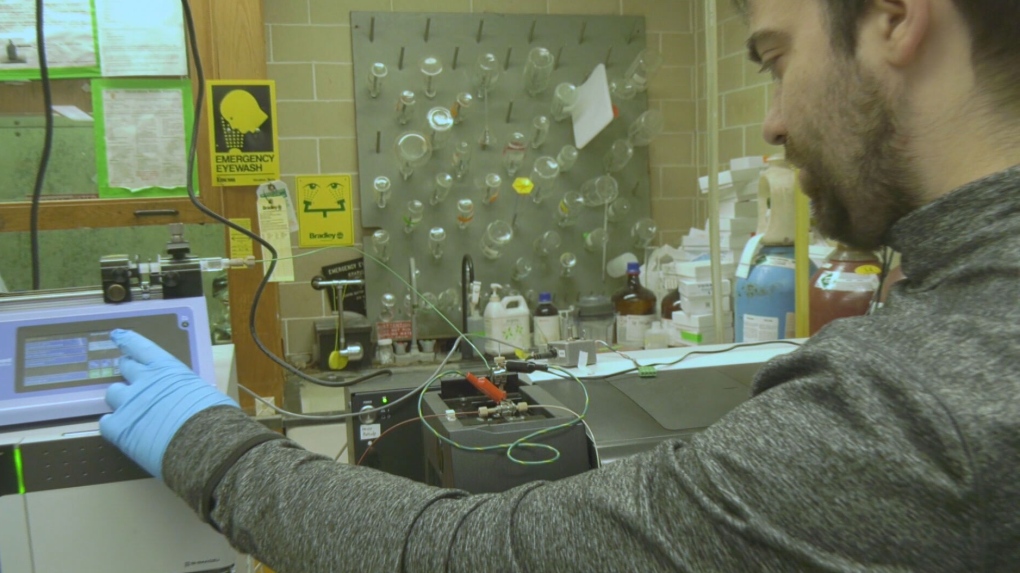UW researchers develop new technique to detect fentanyl in blood samples
University of Waterloo researchers have developed a new blood testing method that can detect potent opioids faster than traditional techniques.
Researchers believe the blood analyzing method can one day save lives.
“We want to know if this person had or did not have fentanyl or any other opioid that we can do in a very fast amount of time,” said co-author of the study, Emir Nazdrajić.
Researchers believe it's twice as fast as other techniques and they can test dozens of samples at once.
“We can do 96 samples at the same time from one station and we can analyze all of them two minutes sequentially for each,” Nazdrajić said.
Using their method, researchers place blood on a well-plate with a buffer. It is then put in a machine before a solid phase micro-extraction probe is used to enhance the drug of interest.
“We will take these fibres quickly, rinse them in the water just to remove any non-specific attachments or outlets from the blood and introduce them to our instrument for analysis,” Nazdrajić said.
It is like a high-capacity sensor that can give doctors quicker insight.
 Emir Nazdrajić uses the machine that analyzes the samples. (CTV News/Chris Thomson)
Emir Nazdrajić uses the machine that analyzes the samples. (CTV News/Chris Thomson)
“Immediate intervention of the physician requires information and this device provides the required information for the physician to take an action,” said Dr. Janusz Pawliszyn, corresponding author of the study and a professor in the department of chemistry.
According to the Government of Canada’s website, more than 40,000 people died in the country from opioid toxicity in the first six months of 2023. More than 80 per cent of those involved fentanyl.
The goal with this new method is to not stop at opioids – but expand it further, to be used to detect other drugs and certain types of diseases.
“We are looking at anti-cancer drugs as well as applications related to the organ transplant to make sure the organ performs correctly,” said Pawliszyn.
CTVNews.ca Top Stories

DEVELOPING Jasper updates: Wildfire reaches townsite
One of two wildfires threatening Jasper National Park has reached the townsite.
Alberta calls in army to assist with wildfire situation
Alberta has called in the Canadian Armed Forces to help assist with the worsening wildfire situation in the province.
Biden says he ended re-election bid to unite party
U.S. President Joe Biden on Wednesday delivered a solemn call to voters to defend the country's democracy as he laid out in an Oval Office address his decision to drop his bid for reelection and throw his support behind Vice President Kamala Harris.
Barrie-Innisfil MPP 'blacked-out' and crashed car into window of child care centre
Staff at a Barrie child care centre say they are frustrated by what they call a local MPP's inadequate response after a car crashed through a window in one of the toddler rooms.
2 Canadians being 'sent home immediately,' removed from Olympic team after drone incident
An analyst and an assistant coach with Canada Soccer are being removed from the Canadian Olympic Team and 'sent home immediately,' according to the Canadian Olympic Committee.
An unwelcome attendee has joined the Paris Olympic Games: COVID-19
After a handful of Australian water polo players tested positive for COVID-19 this week, questions have emerged around how the spread of the disease will be mitigated at the Summer Olympic Games in Paris.
Vacations, meals, booze: Contractor used $100K of charity's money for personal expenses, B.C. court finds
A B.C. man who was hired to help a non-profit build a food hub but instead spent the money on personal expenses – including travel, restaurants, booze and cannabis – has been ordered to pay more than $120,000 in damages.
Male, female killed, 2 others injured in 'gun battle' outside Toronto plaza: police
Two people are dead and two others suffered serious injuries following a shooting that police have described as a 'gun battle' outside a plaza in Scarborough, Ont. early Wednesday morning.
Wildfire north of Calgary prompts evacuation alert, highway closures
A wildfire is prompting evacuations and highway closures north of Calgary.





























